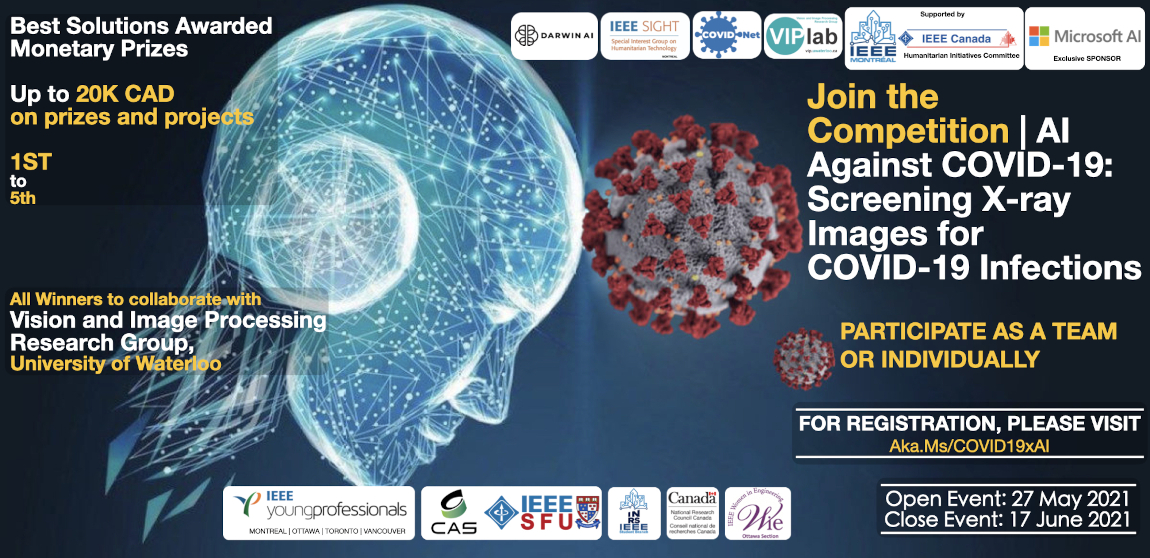AI against COVID-19: Screening X-ray Images for COVID-19 Infections
Join the virtual competition on AI for COVID diagnosis, thanks to Microsoft Canada, the exclusive technology and cloud platform sponsor!

The coronavirus disease 2019 (COVID-19) pandemic, caused by the severe acute respiratory syndrome coronavirus 2 (SARS-CoV-2) virus, has generated an unprecedented global health crisis, with more than 2.7 million deaths worldwide. Do you want to contribute to the fight against this pandemic?
IEEE SIGHT (Special Interest Group on Humanitarian Technology) of Montreal Section, Vision and Image Processing Research Group of the University of Waterloo and DarwinAI Corp. invite data scientists, students and professionals working on Artificial Intelligence (AI) to participate in a virtual competition to help medical researchers diagnose COVID-19 with chest X-ray (CXR) images. The ultimate goal is to contribute to the development of highly accurate yet practical AI solutions for detecting COVID-19 cases and, hopefully, accelerating the treatment of those who need it the most. Moreover, this AI for Good initiative will also allow us to take action on at least one of the United Nations Sustainable Development Goals (SDGs), Good Health and Well-being.
In the First Phase of the competition, the challenge consists of designing robust machine learning algorithms to predict if the subjects of study are either COVID-19 positive or COVID-19 negative. The dataset for this competition is the dataset curated by COVID-Net, a global open-source initiative launched by DarwinAI Corp., Canada, and Vision and Image Processing Research Group, University of Waterloo, Canada, for accelerating advancements in machine learning to aid healthcare workers around the world in the fight against the COVID-19 pandemic. More about the COVID-Net initiative and available open-source resources are available here. In the Second Phase, the 5 top teams of the first phase will have the opportunity to refine their solution and submit a proposal for a follow-up project to positively impact society or the academic community.
This competition is organized in collaboration with the National Research Council Canada and is co-hosted by the IEEE Young Professionals Affinity Groups of Montreal, Ottawa, Toronto and Vancouver Sections, Vancouver Circuit and Systems (CAS) Technical Chapter, the Student Branches of INRS (Institut National de la Recherche Scientifique) and Vancouver Simon Fraser University, WIE (Women In Engineering) Ottawa. It is largely sponsored by Microsoft, and partially by the IEEE Canada Humanitarian Initiatives Committee and the IEEE Montreal Section.
How to participate
Note: This competition intended for participants living in Canada, due to restrictions on funds transfer. Check the specific rules for eligibility of international participants.
NO PURCHASE NECESSARY TO ENTER OR WIN.
The competition is hosted on the Eval.ai online platform. To participate, you or your team will need to perform the following steps:
- Register individually at the link provided below on the current webpage (vTools).
- Register yourself or your team at the link on Eval.ai: https://eval.ai/web/challenges/challenge-page/925/participate. Follow the instructions here: https://evalai.readthedocs.io/en/latest/participate.html#.
- Download the dataset from https://www.kaggle.com/andyczhao/covidx-cxr2.
- Design an AI algorithm that gets CXR images as inputs and predicts the labels of the images in the output (COVID or non-COVID).
- Train your AI algorithm using the training dataset.
- Submit your predictions through Eval.ai for evaluation against the test dataset for the competition.
Prizes
For the First Phase, the first five best solutions will be awarded monetary prizes and Azure credits:
- First place: 1,000 CAD + 500 CAD in Azure.
- Second place: 800 CAD + 300 CAD in Azure.
- Third place: 600 CAD + 300 CAD in Azure.
- Fourth place: 400 CAD + 300 CAD in Azure.
- Fifth place: 300 CAD + 300 CAD in Azure.
The top 5 teams on the leaderboard will also have the following opportunities:
- Participate in the 2nd phase to refine their solution and receive funding for a project.
- Write a scientific paper with the Vision and Image Processing Research Group, from the University of Waterloo, to explain their approach.
For the Second Phase, the best three projects can receive funds up to the following amounts:
- Project 1: 5,000 CAD.
- Project 2: 5,000 CAD.
- Project 3: 4,000 CAD.
Term of funding: Up to 4 months following the announcement of the selected teams. The deadline is December 31st, 2021.
For more information, visit IEEE SIGHT Montreal website.
Date and Time
Location
Hosts
Registration
-
 Add Event to Calendar
Add Event to Calendar
Loading virtual attendance info...
- Contact Event Hosts
-
Vision and Image Processing Research Group, University of Waterloo
In collaboration with the National Research Council Canada
- Co-sponsored by Microsoft Canada (exclusive cloud platform sponsor), IEEE Canada Humanitarian Initiatives Committee and IEEE Montreal Section
Agenda
Updated: Deadline to register: June 7th, 2021
First Phase:
Opening ceremony: May 27th, 2021. Did you miss it? Check the recording here.
The competition starts on: May 31st, 2021
Workshop and Networking session: June 5th, 2021
The competition ends on: June 14th, 2021
Closing ceremony: June 17th, 2021
Second Phase (for top 5 teams):
Deadline for submission of project proposals: July 15th, 2021
Announcement of the selected teams: August 22nd, 2021
Acknowledgment
We wouldn't be able to host this competition without the help of our incredible sponsor Microsoft Canada, as well as the IEEE Canada Humanitarian Initiatives Committee and the IEEE Montreal Section.


